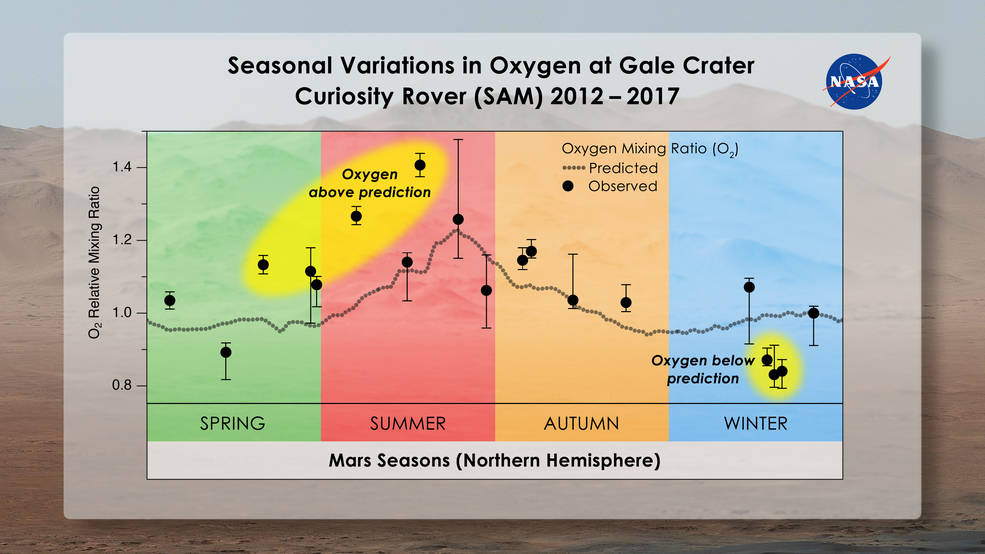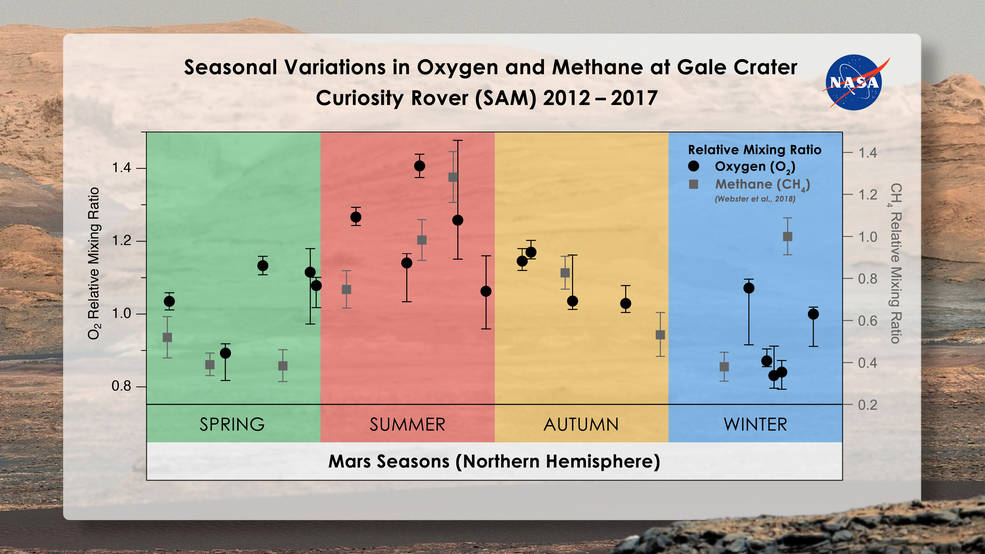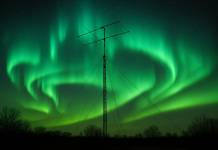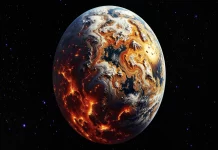Atmospheric gases on Mars sure provide us with plenty of mystery. First, there was that business with the disappearing, reappearing methane.
Now, oxygen levels have been observed rising and falling over the Gale Crater, by amounts that just don’t fit any known chemical reactions. Organic or geological processes?

The new data comes from Curiosity that’s been up there for three Mars years now (that’s six Earth years).
And the measurements show that oxygen in the planet’s atmosphere isn’t behaving entirely as expected.
Oxygen on Mars
There actually isn’t all that much oxygen on Mars. Most of its thin atmosphere (95 percent by volume) is carbon dioxide, or CO2. The rest is made up of 2.6 percent molecular nitrogen (N2), 1.9 percent argon (Ar), 0.16 percent molecular oxygen (O2), and 0.06 percent carbon monoxide (CO).
On Mars, atmospheric pressure changes over the course of the year.
During winter, CO2 freezes over the pole, which causes the pressure to drop across the hemisphere. This results in a hemisphere-to-hemisphere redistribution of gases to equalise atmospheric pressure planet-wide.
In spring, when the polar caps melt and release the CO2, the opposite effect occurs: pressure initially rises in that hemisphere, then evens out as gases are redistributed towards the winter hemisphere.
So, the fluctuations of the other gases are predictable in proportion to the CO2 levels. Or at least, they should be. In the case of nitrogen and argon, it is – these gases have been behaving more or less exactly as expected. But oxygen? Nope.
Mysterious Oxygen Behavior on Mars
During spring and summer, oxygen rose by around 30 percent, dropping back to normal levels in autumn. This happened every year, but since the amount by which the oxygen rises varies from year to year, it seems like something is adding the oxygen, and then taking it away again.
There is no known process that can produce this result.

The obvious question for such an odd measurement was whether there could be something wrong with the Quadrupole Mass Spectrometer instrument or software. Several checks saw that it was all working fine.
Another possibility was whether the oxygen could be produced by water or carbon dioxide somehow breaking apart in the atmosphere. This was quickly ruled out too – there’s not nearly enough water in the Martian atmosphere, and CO2 breaks down too slowly to fit the observed fluctuations.
Now, Martian soil does contain a lot of oxygen. But the conditions required to release it have not been observed – and that wouldn’t explain where it disappears to each year. The process whereby solar radiation breaks apart oxygen and it dissipates into space is likewise too slow.
“We’re struggling to explain this,” said planetary scientist Melissa Trainer of NASA’s Goddard Space Flight Center.
“The fact that the oxygen behaviour isn’t perfectly repeatable every season makes us think that it’s not an issue that has to do with atmospheric dynamics. It has to be some chemical source and sink that we can’t yet account for.”
Methane As a Clue?
But there is one clue. The methane. It, too, rises dramatically over Mars’ summer months, increasing by up to 60 percent. Sometimes the methane and oxygen levels even seem to rise in tandem. It’s possible that whatever it is that causes the methane fluctuations is also causing the oxygen fluctuations.

What that could be is still a huge question. Both gases can be produced through organic processes – that is, life – and both can be produced through geological processes.
We don’t, as yet, have any evidence that there is life on Mars, but nor can it be ruled out as a cause.
However, the team believes it is much more likely to be geological.
“We have not been able to come up with one process yet that produces the amount of oxygen we need,” said astronomer Tim McConnochie of the University of Maryland.
“But we think it has to be something in the surface soil that changes seasonally because there aren’t enough available oxygen atoms in the atmosphere to create the behaviour we see.”
So what the heck is going on with Oxygen in Mars atmosphere? Any ideas? [NASA, AGU, Science Alert]













First they convince everyone they know everything and then admit they know nothing.
you mean the all knowing psychophants don’t know squat? Who knew?